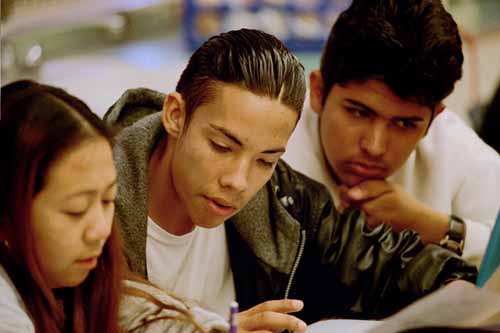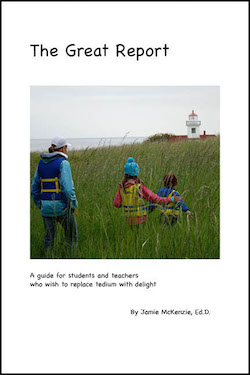Order McKenzie books online with a credit card
Bring Jamie to your school or district for a great workshop.
Summer Issue
Vol 25|No 6|Summer 2016
 |
|---|
Clever is as clever does
“For the things we have to learn before we can do them, we learn by doing them.” ― Aristotle, The Nicomachean Ethics By Jamie McKenzie (about author) |
We need students who are clever and smart. The best way to create them is to emphasize learning activities that involve invention and creative thinking. For three decades various groups and vendors have suggested that the purchase of new technologies would work a number of miracles and cure many of the problems plaguing schools. Some school leaders jumped on this bandwagon trumpeting the benefits of so-called "smart classrooms." No matter how many smart boards, laptops and other paraphernalia are crammed into a classroom, there is no way it will become smart. What we really need are smart kids and smart teachers, an achievement that can only be realized by investing heavily in professional development to balance the investment in equipment. For the past sixteen years too much attention has been paid to testing as a change strategy and too little has been paid to capacity building. Just what do we mean by "smart"The words are tossed about quite loosely and applied to water, phones, watches, homes, cars and just about anything.
Stretching the word like silly putty to cover so many technologies and aspects of our society dilutes its meaning, much like the dramatic decline of the word "awesome" when frequently applied to the trivial, the mundane and the mediocre.
If schools hope to make students smarter, it pays to focus attention on the best meanings of the word. Do we really want to raise a generation of fresh, impertinent, sassy and impudent thinkers? Are we actually hoping to create canny, cagey, shrewd wheeler-dealers? There are better goals. How about astute, intelligent and clever? Let's be clear about our intentions. Which of the following words appeal to your sense of purpose?
How can we best nurture the habits of mind (Art Costa) that will create students who are clever, smart, brilliant and bold? The Art Costa Centre For Thinking offers concrete lesson plans and strategies that align wonderfully with the theme of this article. Schooling for Bold and Clever ThinkingIn recent years, as government leaders in many nations have placed excessive emphasis upon math and reading scores, they have had a chilling effect upon learning programs in many schools. Even the introduction of the Common Core Standards in the USA - an effort intended to elevate the performance and thinking of students - has failed to create encouraging evidence of student "smartness" on the 2015 NAEP tests, as reported in the Washington Post article "What the national drop in 2015 NAEP test scores really means."
If we wish to enhance the cleverness of our students, we must engage them in activities that call for nimble thinking, agility and imagination. There must be a focus on inventiveness. And both teachers and students must be highly skilled at synthesis - the process of changing things around in order to make them better. To promote cleverness, teachers must emphasize activities that require such thinking. To illustrate this shift in pedagogy, I have created a table below with mundane activities on the left and nurturing ones on the right. It is not that mundane activities are bad in themselves. The issue is one of insuring balance.
Each teacher might review weekly and monthly lesson plans to ask what percentage of class time is devoted to activities that will develop students to be both smart and clever. We are looking for students who can demonstrate ingenuity as they face the tests of life as well as challenging tests designed to measure progress on the Common Core Standards or the NAEP (National Assessment of Education Progress.)
GlossaryRegurgitation - To repeat (information) without analyzing or comprehending it: facts that can then be regurgitated at examinations. * Heuristics - The study of effective problem-solving strategies like chunking the problem, drawing a picture of the problem, etc. (more examples) * Synthesis - Changing the elements of something to make it better. When students use the Six Traits of Effective Writing to improve their drafts, they are employing synthesis. (more on synthesis) Problem-solving - There is a rich literature describing how to engage students in authentic learning and problem-based learning, grappling with issues and challenges from the world and coming up with suggestions and action plans. "What should we do about the Snake River? Local traffic problems? The homeless?" Role-Playing - When we ask students to act out situations from literature, history or current events and suggest ways characters might have changed outcomes, we are looking for them to demonstrate smart and clever thinking. "How could Louis XVI have avoided the Revolution? Imagine you were Jay Gatsby. What would you change?" Simulation - Companies like Interact offer dozens of historical and political simulations that place students in challenging decision making situations such as the Underground Railway, the Trail of Tears and Vietnam. Creating - Writing a poem, a speech, an essay or a story which will involve original and fresh thinking would be a great time to demonstrate smart and clever thinking. Designing a science experiment would also be a good opportunity for cleverness. Fixing - When something is not working properly, it often takes cleverness to set things straight. One clever statement insists that "When you are caught on the horns of a dilemma, you should grab the tail." Often, the fix will demand "out of the box thinking" rather than conventional thinking. Inventing - When something new is needed, is the student clever enough to figure out what will get the job done? Challenging - Doubt can be the parent of invention. Students must learn to question and challenge proposals, assumptions and ideas instead of taking them at face value. "Challenging Assumptions" Planning - It is one thing to have or create an idea, quite another to translate the idea into action. Students studying problems and issues should be challenged to come up with action plans that will make a difference. Theorizing - "Why do you suppose X is happening?" In exploring cause and effect, students will pose and test hypotheses that might provide an explanation. Believing - It is not enough to study things wihout taking some kind of a stand. We hope that students will learn to apply their values to the issues they study, that they will create beliefs to guide actions. "Which candidate would make the best President?"
* These definitions were supplied by the Apple Dictionary.
|
|---|


